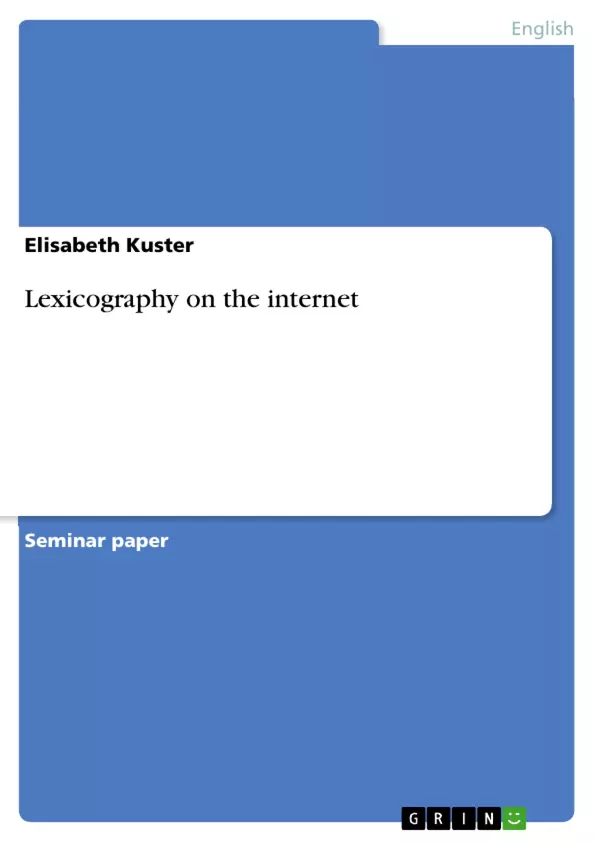In the 1960s the idea of a worldwide communication-platform was born, which later came to be known as the Internet. Being used only by scientists and researchers in its beginning, it gained more and more users over the following decades. Now, the world cannot be imagined without the Internet, as millions of people use it every day. But the Internet is not just for entertainment; many people profit from the Internet in various ways. So do lexicographers. In former times lexicographers had no possibility to have such a quick and close access to the daily language as they have now through the Internet.
Inhaltsverzeichnis (Table of Contents)
- Introduction
- International Journal of Lexicography
- Dictionary organizations worldwide
- EURALEX
- Dictionary Society of North America
- AFRILEX
- AUSTRALEX
- ASIALEX
- Summary
- Discussion Lists
- Conclusion
- Bibliography
Zielsetzung und Themenschwerpunkte (Objectives and Key Themes)
This paper explores the role of the Internet in lexicography, analyzing how it has revolutionized the access and utilization of linguistic resources for lexicographers. It aims to demonstrate the value and potential of the Internet as a tool for researching and developing dictionaries. The paper delves into specific online platforms and resources, evaluating their usefulness for lexicographical research and practice.
- The impact of the Internet on lexicography
- The availability and accessibility of linguistic data online
- Evaluation of online lexicographical resources
- The future of lexicography in the digital age
Zusammenfassung der Kapitel (Chapter Summaries)
- Introduction: This chapter sets the context for the paper, outlining the emergence and widespread adoption of the Internet. It highlights the significance of the Internet in providing lexicographers with rapid and direct access to contemporary language data, which was previously unavailable. The chapter introduces the central question of the paper: how the Internet is beneficial to lexicographers.
- International Journal of Lexicography (IJL): This chapter provides a detailed analysis of the International Journal of Lexicography, a prominent academic journal published by Oxford University Press. It discusses the journal's focus on lexicography, its scope of coverage, and the variety of content it publishes. The chapter also examines the journal's publication process, subscription options, and online accessibility, highlighting features like abstracts, archives, and search functionalities.
Schlüsselwörter (Keywords)
The key themes of this paper revolve around the use of the Internet in lexicography. It focuses on online resources for lexicographers, including academic journals, dictionary organizations, discussion lists, and other platforms. Important keywords include: lexicography, Internet, online resources, dictionary development, linguistic data, academic journals, dictionary organizations, discussion lists.
Frequently Asked Questions
How has the Internet revolutionized lexicography?
The Internet provides lexicographers with rapid and direct access to contemporary language data and linguistic resources, allowing them to monitor daily language changes much faster than with traditional methods.
What are the major international dictionary organizations?
Key global organizations mentioned include EURALEX (Europe), DSNA (North America), AFRILEX (Africa), AUSTRALEX (Australasia), and ASIALEX (Asia).
What is the significance of the International Journal of Lexicography (IJL)?
The IJL is a leading academic journal published by Oxford University Press that focuses on the theory and practice of dictionary-making, now accessible online with searchable archives and abstracts.
How do discussion lists benefit lexicographers?
Discussion lists allow professionals to share insights, ask questions about specific word usages, and collaborate on linguistic research in real-time across the globe.
What is the future of lexicography in the digital age?
The paper suggests that lexicography will become increasingly digital, relying on online accessibility, large-scale linguistic databases, and collaborative platforms for dictionary development.
- Quote paper
- Mag. BSc Elisabeth Kuster (Author), 2006, Lexicography on the internet, Munich, GRIN Verlag, https://www.grin.com/document/182967



